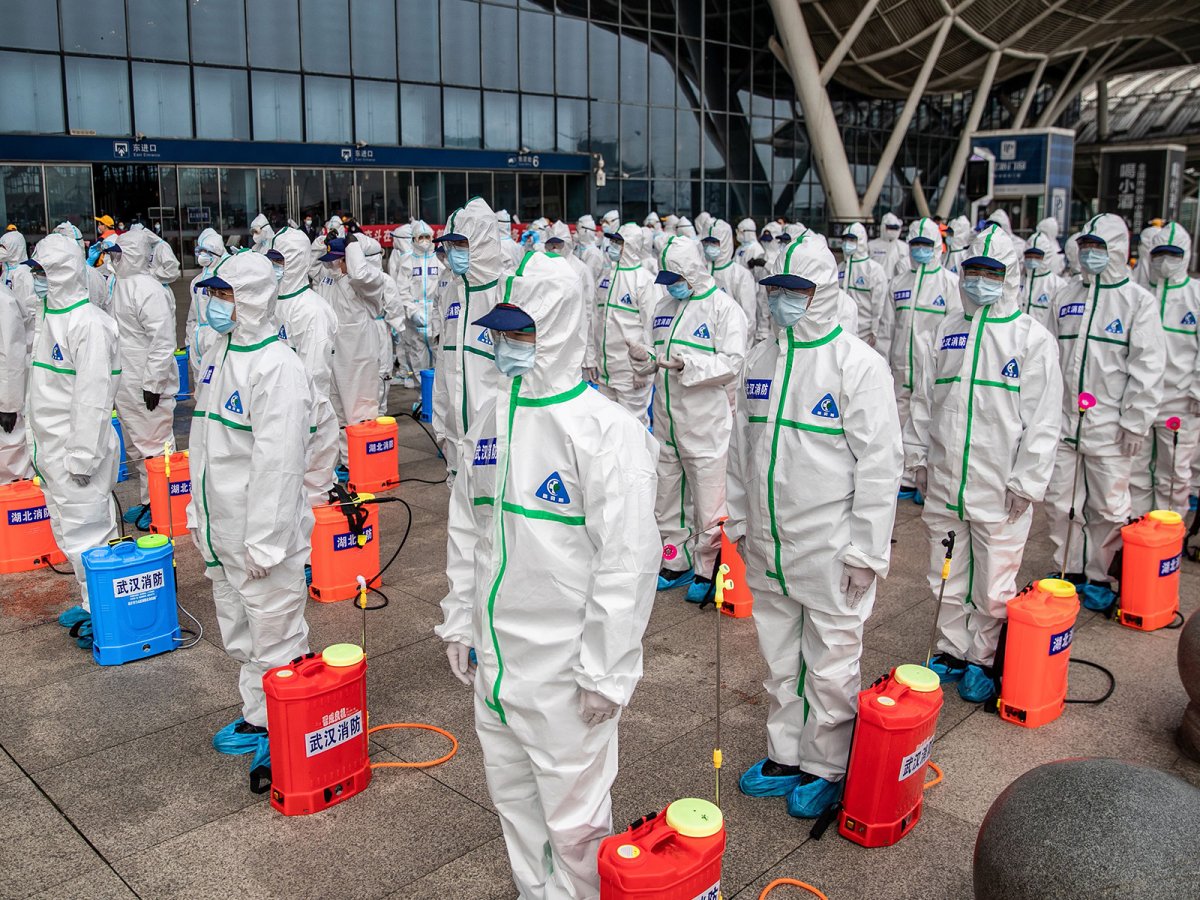Debate about the origins of COVID-19 reemerged after The Wall Street Journal reported on Sunday that the United States Department of Energy (DOE) concluded that the virus likely stemmed from a lab leak in China.
Sars-CoV-2—first discovered in Wuhan, China, in December 2019—has spread across the globe ever since, killing more than 6.8 million people worldwide, according to Johns Hopkins University, and having life-altering effects on many others. From the onset of the pandemic, questions emerged about the virus' origins with two leading theories typically dominating the scientific community.
Newsweek reported on March 27, 2020, and corroborated by two U.S. officials, that U.S. intelligence revised its January assessment in which it "judged that the outbreak probably occurred naturally" to now include the possibility that the new coronavirus emerged "accidentally" due to "unsafe laboratory practices" in Wuhan.
The classified report, titled "China: Origins of COVID-19 Outbreak Remain Unknown," ruled out that the disease was genetically engineered or released intentionally as a biological weapon.

"We have no credible evidence to indicate SARS-CoV-2 was released intentionally or was created as a biological weapon," the report found. "It is very unlikely that researchers or the Chinese government would intentionally release such a dangerous virus, especially within China, without possessing a known and effective vaccine." Every scientist interviewed by Newsweek for the article also rejected categorically the notion that the virus was intentionally released.
While U.S. government agencies largely remain divided about the origins of the disease, most scientists initially believed the virus was likely transmitted to "patient zero" via a bat in an open-air market in Wuhan. However, a second theory that the virus could have been man-made and accidentally leaked from a nearby lab has also gained traction.
The Wall Street Journal reported on Sunday that the DOE became the second federal agency to determine, with "low confidence," that the virus likely originated in a Wuhan lab, joining the Federal Bureau of Investigation (FBI). The determination came as a result of new intelligence. The DOE oversees several U.S. national labs, some of which conduct advanced biological research, according to the Journal.
Still, the intelligence community also remains divided about how the virus originated. Four other agencies, however, maintain that the virus likely spread naturally, while two remain undecided about its origins, according to the newspaper. The FBI concluded that the pandemic resulted from a lab leak with "moderate confidence" in 2021.
Sunday's report did not confirm or show evidence of conspiracy theories that have spread on social media amid the pandemic, including that Dr. Anthony Fauci, the former director of the National Institutes of Allergy and Infectious Diseases, was involved in the leak.
When reached by Newsweek, a DOE spokesperson on Sunday declined to comment on specifics regarding the report. The spokesperson said, "The Department of Energy continues to support the thorough, careful, and objective work of our intelligence professionals in investigating the origins of COVID-19, as the President directed."
China has denied lab leak theories. In June 2022, the Chinese government's official press agency, Xinhua, dismissed any suggestion that the virus leaked from a Chinese lab, arguing the theory was "concocted by anti-China forces for political purposes."
Social Media Reacts
Meanwhile, many people took to social media to restart the debate about the origins of COVID-19 following the new report.
Bloomberg Indices researcher Steve Hou questioned what prompted the DOE to make its determination.
"It would be helpful to at least get a vague sense of the evidence that shifted the position from 'natural cause with low confidence' to 'accidental lab leak with low confidence.' Most of us out here, myself included, immediately jumped to 'lab leak with high confidence' at the start of the conflict based on the coincidental locations of the specific purpose labs alone," Hou tweeted on Sunday.
It would be helpful to at least get a vague sense of the evidence that shifted the position from "natural cause with low confidence" to "accidental lab leak with low confidence". Most of us out here, myself included, immediately jumped to "lab leak with high confidence" at the... https://t.co/5bSW3yeZX5 pic.twitter.com/zKVzt8LJyQ
— Steve Hou ("CONSUME LESS!") (@stevehouf) February 26, 2023
Sarah Isgur, editor of The Dispatch, tweeted, "Latest example of why 'just ban misinformation' isn't so easy. Who gets to decide what is misinformation? What happens when new facts come to light? Ditto mask effectiveness, ditto natural immunity. All things labeled obvious misinfo; all now revisited."
Latest example of why "just ban misinformation" isn't so easy. Who gets to decide what is misinformation? What happens when new facts come to light? Ditto mask effectiveness, ditto natural immunity. All things labeled obvious misinfo; all now revisited. https://t.co/dRMkpxrRWi
— Sarah Isgur (@whignewtons) February 26, 2023
Author Michael Shellenberger tweeted: "Now that the U.S. Department of Energy has joined FBI in concluding that the coronavirus likely leaked from a lab, it's worth remembering that the media, en masse, condemned the lab leak theory as a 'debunked conspiracy theory,' and Facebook censored people who dared suggest it."
Now that the U.S. Department of Energy has joined FBI in concluding that the coronavirus likely leaked from a lab, it's worth remembering that the media, en masse, condemned the lab leak theory as a "debunked conspiracy theory," and Facebook censored people who dared suggest it pic.twitter.com/RuT0w0SgpV
— Michael Shellenberger (@ShellenbergerMD) February 26, 2023
Update 02/26/2023, 11:40 a.m. ET: This story was updated with comment from the Department of Energy.
Uncommon Knowledge
Newsweek is committed to challenging conventional wisdom and finding connections in the search for common ground.
Newsweek is committed to challenging conventional wisdom and finding connections in the search for common ground.
About the writer
Andrew Stanton is a Newsweek weekend reporter based in Maine. His role is reporting on U.S. politics and social issues. ... Read more
To read how Newsweek uses AI as a newsroom tool, Click here.








